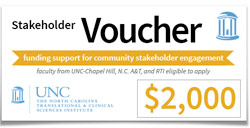NC TraCS offers new $2K voucher to support stakeholder engagement

The engagement of patients and other healthcare stakeholders is a critical part of translational research, and yet many scientists and clinicians find it difficult to interact with the world outside the ivory tower. Thankfully, they don’t need to go it alone. NC TraCS established two Community Advisory Boards (CABs) in Greensboro and Wake County to help increase research collaborations between community organizations and UNC researchers. These CABs tout representation from 17 NC counties and a broad spectrum of stakeholders that include health care providers, community advocates, business representatives, policy makers, and members of the faith community.
The CAB consultation service has been available for years, but now a new voucher program can reduce the expenses associated with seeking its help. NC TraCS provides vouchers in the amount of $2,000 to assist clinical and translational researchers who want to implement a proposed study to move a research project forward, by providing rapid access to funds that will support almost any aspect of promising and innovative research.
“We created the voucher program to encourage investigators to seek stakeholder engagement, both when they are crafting a research proposal and also while they are in the middle of the implementation process,” said Melissa Green, MPH, former administrator director of Community Academic Resources for Engaged Scholarship (CARES) at NC TraCS. “Any project that requires community engagement could benefit from our service, including population-based research, clinical trials, and patient-centered outcomes research.”
Translational researchers who seek to employ community engagement strategies can seek intensive consultation services from the CABs and the PRIME Collective, LLC. The PRIME Collective, LLC is a group of community experts with extensive experience in how to incorporate principles of community engagement into all phases of a research project.
As CAB coordinator Ginny Lewis explains, a typical consult involves an intensive two-hour session conducted in person, along with a series of pre- and post-meeting activities that are often conducted over the phone. Depending of the needs of the researcher, CAB members could help in a number of ways, including reviewing the research proposal and creating patient-centered and community-centered aims, identifying specific incentives that could be valuable to the community, organizing patient stakeholder groups, and designing an evaluation plan. After the consultation session, they might continue to assist investigators by carrying out a variety of activities to expand community engagement.
Jacqueline Halladay, MD, MPH, associate professor of family medicine and co-director of the North Carolina Network Consortium (NCNC), engaged the WAKE CAB in the design of a PCORI back pain trial application. She said that the feedback from the CAB group was sent around to all of the institution involved in the proposal and became "required reading" of all the investigators.
“This was an application for a large pragmatic trial, thus there were lots of people that needed to read this and work to include the ideas into the proposal,” said Halladay. “But the most challenging part was finding ways to pay for the CAB with pre-award dollars.”
The new award will provide a $2,000 voucher for CAB consultation on a research proposal. Pilot grant funds will be administered via PRIME Collective, LLC to support the CAB member consultation According to the RFA, investigators may request funds to support consultation with the NC TraCS CAB to participate in preparing a proposal, review an existing proposal, or participate in the design of interventions for a research proposal. The PRIME Collective will plan and facilitate community engaged consultations and provide follow-up recommendations to the investigative team. NC TraCS CARES staff will work closely with investigators throughout the grant period to monitor progress and, where necessary, provide mentoring.
“Their ideas were extremely helpful in validating the need for the transparent approach we were taking towards research knowledge,” said Carol Breland, MPH, RCP, director of Research Recruitment at NC TraCS. Breland consulted with both the Wake CAB and the Greensboro CAB for feedback on the website for Join the Conquest, a NC TraCS-sponsored initiative to increase public participation in clinical research studies.
“They also helped in giving feedback on the navigation of the site, so that we modified our number of “clicks” to make the joining process simpler,” she added. “I would advise other researchers to seek out a consultation with the CAB early in the research design phase, where their input can really save a lot of headaches and rework later on!”
For more information on the TraCS $2K Stakeholder Engagement Voucher, please visit:
tracs.unc.edu/index.php/services/pilot-program/stakeholder-engagement-voucher
The next due date is April 19, 2016. The submission guidelines are available at:
tracs.unc.edu/docs/pilotprogram/NC_TraCS_Stakeholder_Engagement_2K_Voucher_RFA.pdf
About NC TraCS
The NC TraCS Institute is home to the Clinical and Translational Science Awards (CTSA) program at UNC. The CTSA program is led by the NIH’s National Center for Advancing Translational Sciences (NCATS).
NC TraCS combines the research strengths, resources and opportunities of UNC, its new partner RTI International (RTI) and planning partner North Carolina Agricultural and Technical State University (N.C. A&T) to accelerate clinical and translational research from health science discovery to dissemination to patients and communities.
For more information about NC TraCS services and programs, please visit tracs.unc.edu or contact our TraCS Central Coordinator at This email address is being protected from spambots. You need JavaScript enabled to view it., 919.966.6022, or 866.705.4931.
- Created on .



